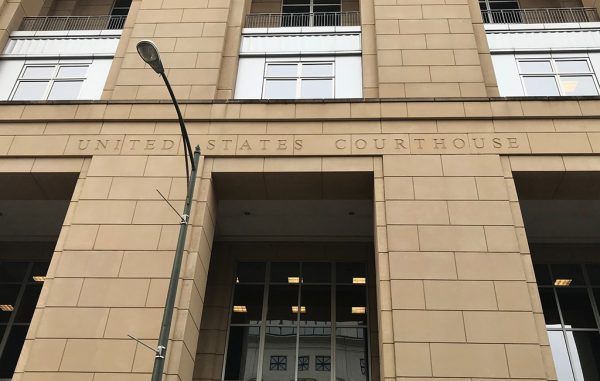
Moody’s case is playing out in the U.S. District Court for the Eastern District of Virginia on Broad Street. (BizSense file photo)
With the assets of his company and his clients still frozen, a Chesterfield man accused by the SEC of running a $5 million Ponzi scheme soon may have more than a civil lawsuit and angry investors to contend with.
Court filings in the Securities and Exchange Commission’s civil case against Edward Lee Moody Jr. state that the matter has been put on hold while potential criminal proceedings are pursued.
“The Court stays this matter pending further developments in the criminal action,” an Aug. 8 filing states.
Court records do not go into further detail.
The SEC declined to comment on the case.
A message left for the U.S. Attorney’s Office in the Eastern District of Virginia, which typically prosecutes federal white collar criminal cases, was not returned by press time.
Moody could not be reached for comment, as numbers listed for his company have been disconnected.
Moody, 47, along with his firms CM Capital Management LLC and G.E. Holdings Corp., was accused by the SEC on June 27 of bilking 60 investors out of $4.95 million.
“In reality, Moody invested none of the $4.95 million, but instead, he used the investor funds to pay off earlier investors, to fund his own speculative trading, and for personal expenses,” the SEC claims.
Those personal expenses allegedly included the purchase of a $364,000 house, a car, a remodeling of his home, travel to Las Vegas, and restaurant and bar tabs.
The SEC successfully argued for a freeze on the assets of Moody and his investor accounts, leaving investors wondering how to access their funds.
His alleged scheme began in October 2009 and his victims were primarily in Virginia, Maryland and California.
It was perpetuated in part by fake monthly account statements Moody allegedly doctored and sent to clients, purporting to show where their money had been invested and supposed profitable returns. He modeled the statements after those of well-known brokerage Scottrade, replacing the Scottrade name with G.E. Holdings.
The statements also said his firms were members of FINRA and the SIPC, the regulatory bodies that oversee securities brokers. Neither ever has been a member of either organization, the SEC claims.
The SEC alleges violations of provisions of the federal Securities Exchange Act, the Securities Act and the Investment Advisers Act. It seeks to force Moody to return the ill-gotten money, as well as pay an undetermined amount of civil penalties.

Moody’s case is playing out in the U.S. District Court for the Eastern District of Virginia on Broad Street. (BizSense file photo)
With the assets of his company and his clients still frozen, a Chesterfield man accused by the SEC of running a $5 million Ponzi scheme soon may have more than a civil lawsuit and angry investors to contend with.
Court filings in the Securities and Exchange Commission’s civil case against Edward Lee Moody Jr. state that the matter has been put on hold while potential criminal proceedings are pursued.
“The Court stays this matter pending further developments in the criminal action,” an Aug. 8 filing states.
Court records do not go into further detail.
The SEC declined to comment on the case.
A message left for the U.S. Attorney’s Office in the Eastern District of Virginia, which typically prosecutes federal white collar criminal cases, was not returned by press time.
Moody could not be reached for comment, as numbers listed for his company have been disconnected.
Moody, 47, along with his firms CM Capital Management LLC and G.E. Holdings Corp., was accused by the SEC on June 27 of bilking 60 investors out of $4.95 million.
“In reality, Moody invested none of the $4.95 million, but instead, he used the investor funds to pay off earlier investors, to fund his own speculative trading, and for personal expenses,” the SEC claims.
Those personal expenses allegedly included the purchase of a $364,000 house, a car, a remodeling of his home, travel to Las Vegas, and restaurant and bar tabs.
The SEC successfully argued for a freeze on the assets of Moody and his investor accounts, leaving investors wondering how to access their funds.
His alleged scheme began in October 2009 and his victims were primarily in Virginia, Maryland and California.
It was perpetuated in part by fake monthly account statements Moody allegedly doctored and sent to clients, purporting to show where their money had been invested and supposed profitable returns. He modeled the statements after those of well-known brokerage Scottrade, replacing the Scottrade name with G.E. Holdings.
The statements also said his firms were members of FINRA and the SIPC, the regulatory bodies that oversee securities brokers. Neither ever has been a member of either organization, the SEC claims.
The SEC alleges violations of provisions of the federal Securities Exchange Act, the Securities Act and the Investment Advisers Act. It seeks to force Moody to return the ill-gotten money, as well as pay an undetermined amount of civil penalties.